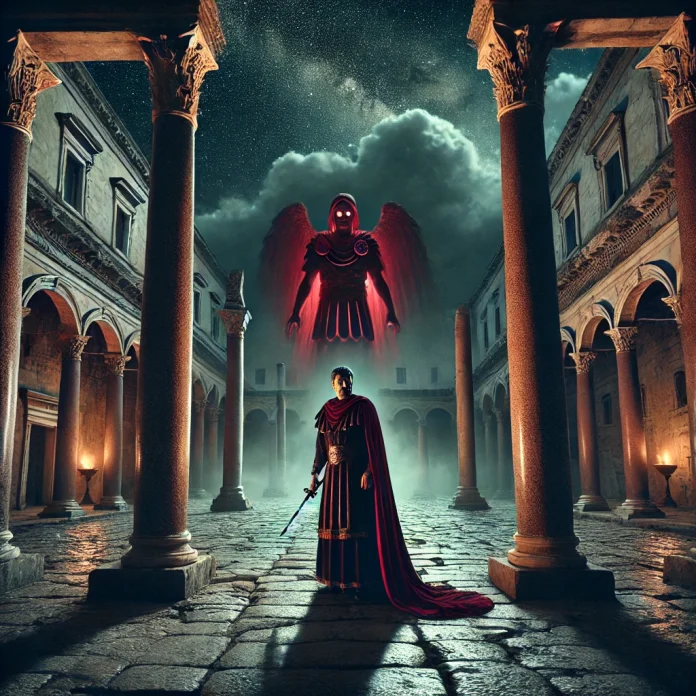Intro:
They called him a god.
Diocletian, the builder of empires, the breaker of men, the ruler who carved his will into stone and flame. But when the purple robes were folded and the armies no longer marched, what remained was a man — aging, silent, and staring into the sea.
In the quiet chambers of his palace, amid gardens and granite, came a final dream.
A dream not of Rome’s glory… but of its reckoning.
The Last Diocletian’s Dream is not a tale of conquest. It is a whisper of conscience, carried on the wind that moves through the ruins he left behind. A night when the sea refused to be silent — and the past came calling with a flaming sword.
The scent of salt and the restless sea filled the cryptoporticus through which the emperor walked during his usual evening ritual. He had likely chosen this bay of yellow flowers and deep blue waters for a reason; he wished to spend his retirement far from fickle politics, tending to cabbage in his small garden nestled within the grandeur of a palace. He had conquered much of the known world, and now found joy in a few square meters of soil. The irony of life. A great emperor — turned farmer.
He sighed wearily, as if mourning the sun that had once again escaped into the depths of the sea. In front of him stood the Island of Deer — not large in appearance, but inexhaustible in treasure. The treasure of stone. He thought, just for a moment, that his soul was like the soul of this kingdom of stone — divinely white at its core, worn and battered on the outside by the world.
“Master, dinner awaits in the triclinium. This evening you have…”
A hand rose slowly toward the sea.
Loyal Licinius fell silent, took a few steps back, and withdrew to his quarters, silently in tune with the late afternoon maestral breeze.
But the sea did not obey.
It continued its tale, its undulating iamb.
The emperor slowly walked back toward the triclinium — the glamorous dining hall with a large marble table at its center.
The Emperor.
The son of a god! Iovius.
Whom the sea does not obey.
“If only they knew what kind of cabbage grows in this palace, they would never have offered me the throne,” he whispered with an ironic smile, before pouring a cup of sabbaia.
Of all the Roman offerings on the table, the strongest in spirit was the ancient Illyrian beer. Illyrian.
Yes, that’s what we called all those we conquered in this rugged Dalmatia.
That’s what we called… my roots.
My villages beyond Salona.
My cradle.
As he set down the foaming cup of sabbaia on the cold table, he realized that nothing grandly Roman around him had the soul of that rustic beer — even his white mane resembled the tongues of the sea more than any Roman wine ever could.
In sabbaia, veritas.
He picked up a green apple from the table and examined it from all angles. With soldier’s precision, he took his seax and sliced it into four nearly identical pieces. In an instant, the whole became four — just like his empire.
Five years ago, he had established the Tetrarchy — the rule of four emperors. He and Maximian were Augusti, and Galerius and Constantius were Caesars. Four emperors, one empire.
Was it yet another brilliant idea from his utopian treasury?
Rome. What is Rome? Glory? Power? The scepter of the gods? Cabbage?
No.
Rome is the sword.
Nearby, rhythmic strikes of gladius echoed — the military camp was in the palace’s northern quarter, near the Golden Gate. The legionaries entertained themselves creatively within the peaceful walls of the palace, perhaps forgetting that the man who lived here was the only emperor in history to willingly relinquish his throne.
The sunset was most beautiful along the long covered portico on the palace’s southern facade, but somehow the night sky always felt most alive in Jupiter’s heart. The Peristyle was dominated by columns of African red granite, brought by ship from Egypt as war spoils. Two black granite sphinxes guarded the entrance to Jupiter’s temple — in that pharaonic setting, the emperor once greeted the people from the portico.
The emperor as demi-god, the reincarnation of Jupiter on earth.
But tonight, the Peristyle was walked by a tired old man in search of meaning.
Though the night resembled countless others before it, something kept the emperor awake. Something not made of stone or any earthly material. Something that passes through walls and time.
The divine Jupiter?
Or perhaps…
a conscience?
“Dioooocleees…” whispered the red darkness.
“Diocleeeeeessss…” it repeated.
Chapter II
The emperor awoke from half-sleep. His back ached with the chill of African red granite from the column against which he’d slumped.
He knew that somewhere nearby were his personal guards and loyal servant Licinius, yet his gaze drifted toward the temple’s portico. Slowly, he rose and walked toward the red darkness as the night sky shimmered with a thousand stars.
“Who are you?” asked the once-mighty master of the world.
“I am you,” answered the red darkness, taking the form of a giant Roman soldier with a flaming gladius glowing like embers from the shadows.
“Only true gods wield such power,” replied Diocletian.
“And that is why you are but an old man, Diocles.
A faithful servant who thought himself a god,
who believed he could shape the world.
A god!”
That final word seemed to erupt from a nearby crypt, voiced by thousands of slaves who had lived the darkness of the substructures after long days of labor.
“All my strength on earth is in you, O mighty Jupiter!” cried Diocletian.
“Jupiter? Is that what you call me?” hissed the red darkness, its tongue flickering like a serpent as it extinguished the flaming gladius.
“This kind of power is yours alone,” answered Diocletian, bowing his head in reverence.
“And your power was once great. You conquered many. You took the world and cast it to its knees.
But even you fell to your knees, O son of Jupiter!” hissed the darkness, then surged through Diocletian’s body and across the entire Peristyle like a youthful storm.
Diocletian felt a sharp pain in his chest. He clutched at it and collapsed, curling into the fetal position on the temple portico. Only in that posture did the pain subside. Any movement — a hand, a leg — brought paralyzing agony.
But nothing hurt as much as his own thoughts.
He had to follow the red darkness.
Bracing on his right elbow with a grimace, he eventually stood, gripping his seax. Pain twisted through every line on his face. He moved back toward the Peristyle, now glowing dark crimson, as if bathed in blood.
To his surprise, it was empty.
From the north side of the palace came drunken soldier songs — though with each step, the songs began to sound more like the howling of wolves.
His thoughts raced like a wounded boar.
He remembered the prophecy of a rustic tavern woman back when he was just a respected soldier — she had told him he would become emperor when he slew the fateful boar.
And he had killed that boar, many times over.
The one on four legs with a spear.
And the one on two legs, with a sword — and stepped into history.
The thought was interrupted by the sphinxes, blocking his entry to the Peristyle. The two black androsphinxes stared with their pharaonic eyes, growing ever larger. In the end, he stepped into their gaze — and saw the Peristyle in flames.
All the beautiful Corinthian columns lay shattered.
The crimson imperial robe flapped in the wind, burning atop a spear pierced through the heart of a crucified man.
Everything burned in bloody red darkness, accompanied by the voices of the underworld, as mighty Rome died in agony.
The man on the cross grew smaller.
The flames grew louder.
Until nothing remained — not even stone upon stone.

